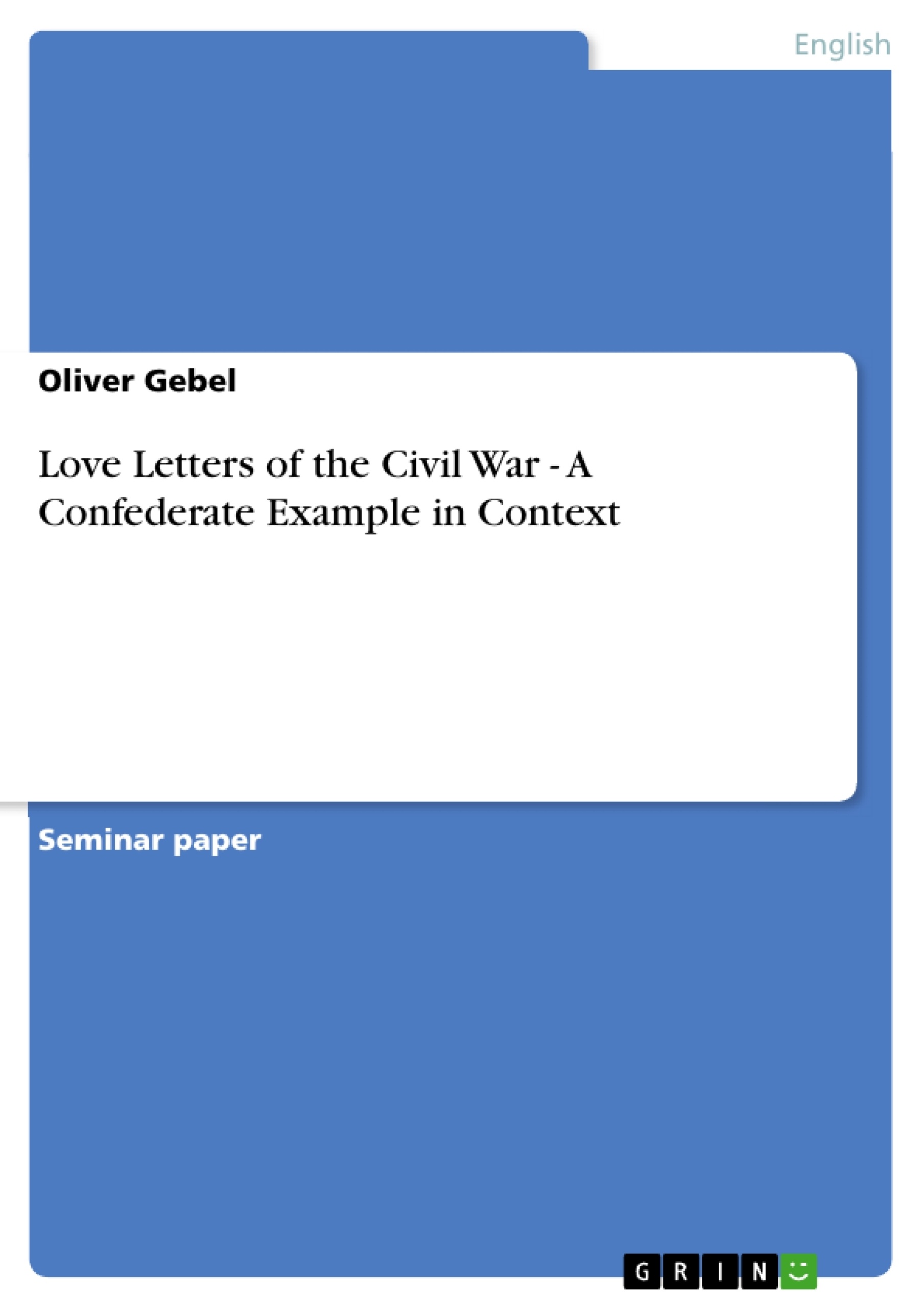Inhaltsverzeichnis (Table of Contents)
- The American Civil War - Historical Setting, Reasons and Implications
- An Approach to the Ontology of the American Civil War
- The Inevitable Course to War
- An Outline of Letter Communication
- Keeping in Touch: An Ontology of Letter Communication
- Reflections on Letter Analysis
- A Letter of Love
- J. C. Morris Letter to his Wife Amanda
- Textual Analysis
Zielsetzung und Themenschwerpunkte (Objectives and Key Themes)
This paper aims to examine the significance of love letters during the American Civil War, particularly focusing on a Confederate example in context. It analyzes the historical context of the war, exploring its origins, implications, and the role of communication during this period. The paper delves into the ontology of letter communication and explores the importance of letters as a means of conveying affection and maintaining connection during a time of conflict.
- The American Civil War as a turning point in American history and its impact on racial relations and warfare
- The role of communication technologies, including letters, telegraphs, and photography, during the Civil War
- The importance of love letters as a means of maintaining connection and emotional support between soldiers and their families
- The social and political context of the Civil War, including the contrasting perspectives of the North and South
- The economic and technological advancements that emerged during the Civil War and their impact on the development of the United States
Zusammenfassung der Kapitel (Chapter Summaries)
- The American Civil War – Historical Setting, Reasons and Implications: This section provides an overview of the historical context of the American Civil War, highlighting its significance as a defining moment in American history. It explores the key factors that led to the conflict, including the issue of slavery, and discusses the far-reaching consequences of the war on American society, politics, and economics.
- An Approach to the Ontology of the American Civil War: This chapter delves deeper into the nature of the American Civil War, examining its origins and significance within the broader context of American history. It discusses the war's impact on racial relations, warfare, and the development of new technologies.
- The Inevitable Course to War: This chapter explores the factors that led to the outbreak of the Civil War, focusing on the escalating tensions between the North and South over issues such as slavery and states' rights. It examines the political and social dynamics that contributed to the conflict and the growing polarization of American society.
- An Outline of Letter Communication: This section focuses on the importance of letter communication during the Civil War. It examines the role of letters in maintaining connections between soldiers and their families, providing emotional support, and conveying personal experiences.
- Keeping in Touch: An Ontology of Letter Communication: This chapter delves into the nature of letter communication during the Civil War, exploring its significance as a primary means of communication and connection. It examines the challenges and opportunities of letter writing in a time of conflict, and the cultural and social context of this practice.
- Reflections on Letter Analysis: This chapter provides a framework for analyzing letters written during the Civil War, considering the historical context, the author's perspective, and the social and cultural implications of the content.
- A Letter of Love: This section examines a specific example of a love letter written during the Civil War by J. C. Morris to his wife Amanda. It analyzes the content of the letter, exploring its themes, style, and emotional impact.
- J. C. Morris Letter to his Wife Amanda: This chapter provides a detailed analysis of the love letter written by J. C. Morris, examining its language, tone, and the author's personal experiences and emotions.
- Textual Analysis: This chapter utilizes various literary and textual analysis techniques to deconstruct the content and meaning of the love letter, exploring its themes, symbolism, and rhetorical strategies.
Schlüsselwörter (Keywords)
The paper focuses on the American Civil War, love letters, letter communication, historical context, social and political dynamics, technological advancements, and textual analysis. It explores the importance of personal narratives and the role of communication in shaping individual experiences and historical events.
Frequently Asked Questions
Why were love letters so important during the American Civil War?
They were the primary means for soldiers and their families to maintain emotional connection, provide support, and share personal experiences during years of separation.
Who was J. C. Morris?
The paper analyzes a specific love letter written by J. C. Morris, a Confederate soldier, to his wife Amanda, using it as a case study for Civil War communication.
How did communication technology change during the Civil War?
The war saw the rise of the telegraph for military use, while letter writing remained the standard for personal life. Photography also began to play a role in how people perceived the war.
What are the main themes found in Civil War love letters?
Common themes include longing, anxiety about the future, descriptions of camp life, religious faith, and the struggle to maintain domestic bonds from afar.
What does the "ontology of letter communication" refer to?
It refers to the nature and being of letters as physical objects that carry the presence of the sender to the receiver, bridging the gap created by the conflict.
- Arbeit zitieren
- Oliver Gebel (Autor:in), 2006, Love Letters of the Civil War - A Confederate Example in Context, München, GRIN Verlag, https://www.grin.com/document/71071



